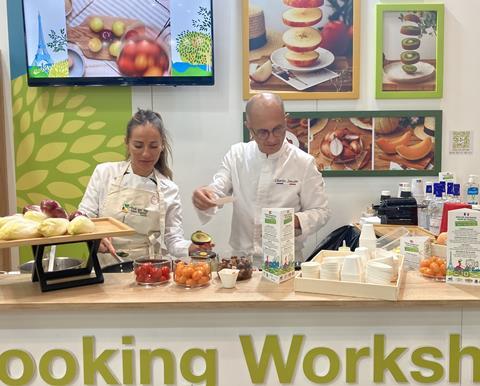With the large Russian and Algerian markets closed to French exporters, France’s priority remains opening up new avenues for French produce
At last month’s Fruit Attraction exhibition, French interbranch organisation Interfel drew inspiration from the Tour de France as it expanded the country’s presence in Madrid, taking visitors on ‘Le Tour Frais’ of France’s various regions, with the Tour Eiffel of fruit and vegetables standing at its centre.

“We wanted to have a bigger impact at Fruit Attraction this year so we have increased our participation by 20 per cent compared with last year,” said international director Daniel Soares.
Interfel was pleased to welcome gastronomic influencer and Masterchef ambassador Celeste García de la Banda, who joined well known Interfel chef Charles Soussin to deliver a live culinary workshop using fresh ingredients from across France.
“Celeste and Charles are promoting Interfel’s theme with their creations,” said Soares. “We are promoting recipes from the different regions: recipes from Brittany, from the south-west, from Val de Loire, from the south-east.”
Soares said that finding new markets was the major priority for French exporters. “France exports less now since the embargo from Russia,” he said. “We’ve also lost the Algerian market, so finding new markets is still vital. We need to restimulate exports of French produce.”
According to Soares, one of the main difficulties is finding new markets that France’s European competitors aren’t equally eyeing.
“It’s complicated because our competitors in Europe like Poland and Italy are looking at the same markets, including the Middle East,” he said. “Asia is a bit different because of the need for individual phytosanitary agreements, which some countries don’t have, so that is a great advantage for France.
“The UK is important, but exports have gone down in the last two years. We now export less than 100,000 tonnes, compared with 200,000 tonnes about ten years ago.”



